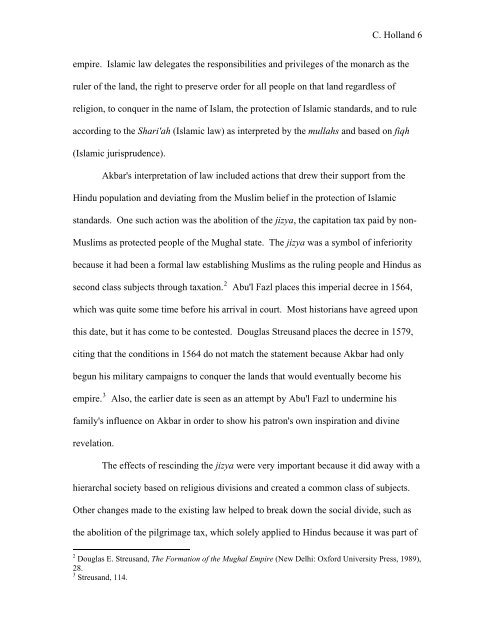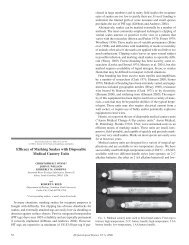Akbar and the Mughal State - University of Georgia
Akbar and the Mughal State - University of Georgia
Akbar and the Mughal State - University of Georgia
Create successful ePaper yourself
Turn your PDF publications into a flip-book with our unique Google optimized e-Paper software.
C. Holl<strong>and</strong> 6<br />
empire. Islamic law delegates <strong>the</strong> responsibilities <strong>and</strong> privileges <strong>of</strong> <strong>the</strong> monarch as <strong>the</strong><br />
ruler <strong>of</strong> <strong>the</strong> l<strong>and</strong>, <strong>the</strong> right to preserve order for all people on that l<strong>and</strong> regardless <strong>of</strong><br />
religion, to conquer in <strong>the</strong> name <strong>of</strong> Islam, <strong>the</strong> protection <strong>of</strong> Islamic st<strong>and</strong>ards, <strong>and</strong> to rule<br />
according to <strong>the</strong> Shari'ah (Islamic law) as interpreted by <strong>the</strong> mullahs <strong>and</strong> based on fiqh<br />
(Islamic jurisprudence).<br />
<strong>Akbar</strong>'s interpretation <strong>of</strong> law included actions that drew <strong>the</strong>ir support from <strong>the</strong><br />
Hindu population <strong>and</strong> deviating from <strong>the</strong> Muslim belief in <strong>the</strong> protection <strong>of</strong> Islamic<br />
st<strong>and</strong>ards. One such action was <strong>the</strong> abolition <strong>of</strong> <strong>the</strong> jizya, <strong>the</strong> capitation tax paid by non-<br />
Muslims as protected people <strong>of</strong> <strong>the</strong> <strong>Mughal</strong> state. The jizya was a symbol <strong>of</strong> inferiority<br />
because it had been a formal law establishing Muslims as <strong>the</strong> ruling people <strong>and</strong> Hindus as<br />
second class subjects through taxation. 2 Abu'l Fazl places this imperial decree in 1564,<br />
which was quite some time before his arrival in court. Most historians have agreed upon<br />
this date, but it has come to be contested. Douglas Streus<strong>and</strong> places <strong>the</strong> decree in 1579,<br />
citing that <strong>the</strong> conditions in 1564 do not match <strong>the</strong> statement because <strong>Akbar</strong> had only<br />
begun his military campaigns to conquer <strong>the</strong> l<strong>and</strong>s that would eventually become his<br />
empire. 3 Also, <strong>the</strong> earlier date is seen as an attempt by Abu'l Fazl to undermine his<br />
family's influence on <strong>Akbar</strong> in order to show his patron's own inspiration <strong>and</strong> divine<br />
revelation.<br />
The effects <strong>of</strong> rescinding <strong>the</strong> jizya were very important because it did away with a<br />
hierarchal society based on religious divisions <strong>and</strong> created a common class <strong>of</strong> subjects.<br />
O<strong>the</strong>r changes made to <strong>the</strong> existing law helped to break down <strong>the</strong> social divide, such as<br />
<strong>the</strong> abolition <strong>of</strong> <strong>the</strong> pilgrimage tax, which solely applied to Hindus because it was part <strong>of</strong><br />
2<br />
Douglas E. Streus<strong>and</strong>, The Formation <strong>of</strong> <strong>the</strong> <strong>Mughal</strong> Empire (New Delhi: Oxford <strong>University</strong> Press, 1989),<br />
28.<br />
3<br />
Streus<strong>and</strong>, 114.





